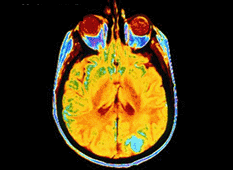
The brain atlas is a good example of wonderful things that can be done on the web - in the interest of information and the advancement of knowledge.
The Allen Institute for Brain Science hosted a launch of its “Brain Atlas” at the U.S. Senate in Washington, D.C., September 26, 2006. ASA staff members Marguerite Colston and Charles Scott were invited guests, along with representatives from the National Institutes of Health (NIH), the National Institute of Mental Health (NIMH), Congress and other advocacy groups.
The Allen Brain Atlas is a Web-based, 3-dimensional map of gene _expression in the mouse brain. Publicly available at no-cost, the map shows which genes are active or “expressed” within the brain, and which regions and cells they are expressed in. New findings already reveal that 80 percent of genes are turned on in the brain, and the map reveals locations of genes associated with specific functions. The Allen Institute aims to give scientists “the gift of time” by making this database available globally over the Internet.
______
Internet freedom reigns in Amsterdam
AMSTERDAM (Reuters) - Amsterdam has the world's busiest Internet exchange, thanks to nuclear physicists and mathematicians who in the 1980s connected their network needs with the academic belief that knowledge needs to be free.
At a time when the neutrality of the Internet is at stake, and Internet service providers (ISPs) are moving to prioritize their premium traffic, the Amsterdam Internet Exchange is a reminder that the Internet was built on the principle of the unrestricted exchange of ideas and information.
The popularity of the AMS-IX. the official name of the exchange, is the result of a liberal foundation which has created a place where ISPs can do business any way they like.
"'Anything goes unless it's forbidden', was our motto from the beginning. We added a few rules later on, but any unnecessary organizing is being prevented," said Rob Blokzijl from Nikhef, the National Institute for Nuclear Physics and High Energy Physics in the Netherlands.
It shares this spirit with the designers of the Internet who decided that all data packets were created equal, and with Tim Berners-Lee who developed the World Wide Web at the Swiss particle physics lab CERN as a universal and neutral platform.
"The public will demand an open Internet," Berners-Lee said in a recent interview with Reuters.
Indeed, the debate over "net neutrality" is one of the biggest issues facing the Web today on both sides of the Atlantic, pitting big cable and phone companies against Internet powerhouses like Google Inc. (more)
No comments:
Post a Comment